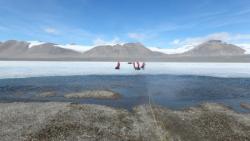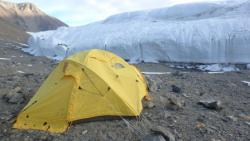Update
Now Archived! PolarConnect event with Kevin Dickerson and Dr. Byron Adams from McMurdo Station. You can access this and other events on the PolarConnect Archives site.
What Are They Doing?

Where Are They?

The McMurdo Dry Valleys are located on the western coast of McMurdo Sound and form the largest relatively ice-free area on the Antarctic continent. The perennially ice-covered lakes, frozen alpine glaciers, and extensive areas of exposed soil and permafrost within the McMurdo Dry Valleys are subject to low temperatures, limited snowfall, and salt accumulation.
Latest Journals

Byron is an evolutionary ecologist in the Department of Biology at Brigham Young University where he teaches Biology, Molecular Biology, and Evolutionary Biology classes. Byron’s approach to understanding biology involves inferring evolutionary and ecological processes from patterns in nature. His most recent projects involve fieldwork in Antarctica, where he and his colleagues on the McMurdo Long Term Ecological Research project are studying the relationship between biodiversity, ecosystem functioning, and climate change. Byron gets stoked about science education and loves interacting with K-12 students and teachers. When he’s not freezing his butt off in the McMurdo Dry Valleys or southern Transantarctic Mountains, he likes spending time with his family and friends in Utah’s wild places.
Dr. Gooseff's research focuses on the characterization and numerical simulation of hydrologic processes and associated biogeochemical cycling. Much of my past and current research has included simulation of introduced and natural tracer transport. The locations of my research projects include polar regions (arctic Alaska, Antarctica) and continental mountain catchments (H.J. Andrews Experimental Forest, Grand Tetons, etc.).




